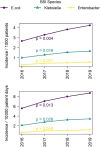Gram-negative bloodstream infections in six German university hospitals, 2016-2020: clinical and microbiological features
- PMID: 39586959
- PMCID: PMC11971176
- DOI: 10.1007/s15010-024-02430-7
Gram-negative bloodstream infections in six German university hospitals, 2016-2020: clinical and microbiological features
Abstract
Purpose: To analyze the longitudinal epidemiology and antimicrobial resistance (AMR) patterns of Gram-negative bloodstream infections (BSI) in Germany.
Methods: Post-hoc analysis of prospectively documented BSI due to Escherichia coli, Klebsiella spp., Enterobacter spp., Pseudomonas aeruginosa and Acinetobacter baumannii from six university hospitals between 2016 and 2020. In a subanalysis 1228 episodes of BSI (E. coli N = 914, Klebsiella spp. N = 314) were analyzed for clinical endpoints and risk factors.
Results: E. coli was the most prevalent cause of BSI, with 5412 cases, followed by Klebsiella spp. (2148 cases), P. aeruginosa (789 cases), Enterobacter spp. (696 cases), and A. baumannii (31 cases). BSI incidence rates were particularly high in haematology/oncology, with E. coli BSI reaching 13.9 per 1000 admissions. Most (58%) of the BSI episodes were community-acquired. A notable finding was the moderate increase of third-generation cephalosporin resistant Enterobacterales (3GCREB) for E. coli from 13.9% in 2016 to 14.4% in 2020 and a decrease for Klebsiella spp. from 16.5% in 2016 to 11.1% in 2020 corresponding to extended-spectrum betalactamase (ESBL) phenotype. In our analysis, the 3GCREB phenotype was not associated with a higher risk of death or discharge with sequelae for E. coli and Klebsiella spp.
Conclusion: Our study provides longitudinal data on Gram-negative BSI in Germany on a clinical basis for the first time. These data underscores the critical need for ongoing surveillance and more pathogen-related clinical data.
Keywords: Bloodstream infection; Cephalosporin resistance; ESBL prevalence; Escherichia coli; Klebsiella; Longitudinal survey.
© 2024. The Author(s).
Conflict of interest statement
Declarations. Competing interests: The authors declare no competing interests.
Figures

References
-
- Meatherall BL, Gregson D, Ross T, Pitout JD, Laupland KB. Incidence, risk factors, and outcomes of Klebsiella pneumoniae bacteremia. Am J Med. 2009;122(9):866–73. 10.1016/j.amjmed.2009.03.034. - PubMed
-
- Pitout JD. Multiresistant Enterobacteriaceae: new threat of an old problem. Expert Rev Anti Infect Therapy. 2008;6(5):657–69. 10.1586/14787210.6.5.657. - PubMed
-
- Tacconelli E, Gopel S, Gladstone BP, Eisenbeis S, Holzl F, Buhl M, et al. Development and validation of BLOOMY prediction scores for 14-day and 6-month mortality in hospitalised adults with bloodstream infections: a multicentre, prospective, cohort study. Lancet Infect Dis. 2022;22(5):731–41. 10.1016/S1473-3099(21)00587-9. - PubMed
-
- Chow JW, Yu VL. Combination antibiotic therapy versus monotherapy for gram-negative bacteraemia: a commentary. Int J Antimicrob Agents. 1999;11(1):7–12. 10.1016/s0924-8579(98)00060-0. - PubMed
MeSH terms
Substances
LinkOut - more resources
Full Text Sources
Miscellaneous

